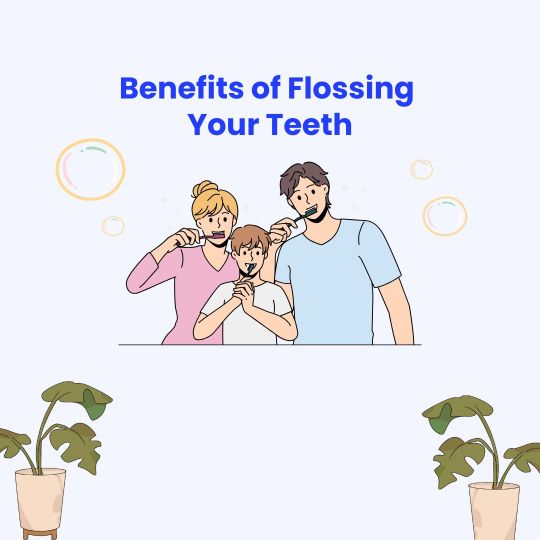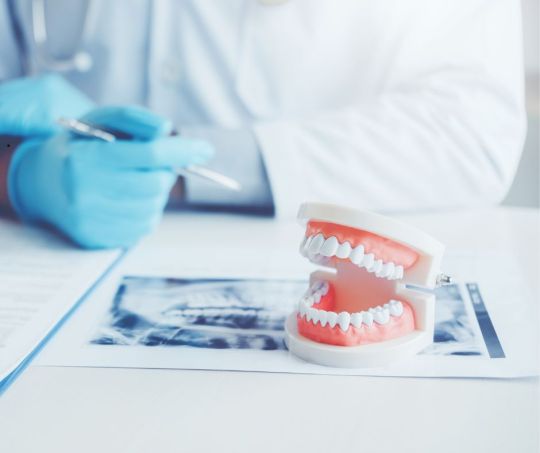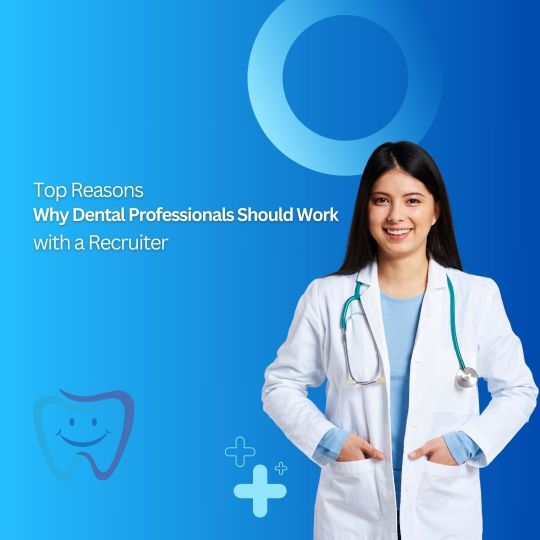Looking for the right dental recruitment services? We are dental recruiters to help you connect, hire & retain best dentists, specialists & hygienist in US & Canada.https://hiresmiles.com/
Don't wanna be here? Send us removal request.
Text
Benefits of Flossing Your Teeth

Let’s be honest. Flossing isn't exactly the most exciting part of your day. I mean, nobody wakes up and shouts, "YES! Time to floss!" But here's the thing—your teeth and gums really, really love it when you do.
Flossing might seem like a small thing, but it plays a huge role in keeping your mouth healthy (and your dentist a little less scary).
So, if you're someone who skips flossing or only does it when there's popcorn stuck between your teeth, this blog is for you.
😬 Why Flossing Even Matters
You brush every day, right? Maybe even twice. That’s great! But brushing alone only cleans about 60% of your tooth surface.
The other 40%? That sneaky stuff hiding between your teeth? That’s where floss comes in like a superhero with dental string. 🦸♂️
Flossing helps remove:
Plaque (that gross sticky stuff)
Tiny food bits (like that annoying popcorn kernel)
Bacteria that causes bad breath and gum disease
Bottom line: If you want a fresh mouth and strong gums, flossing is non-negotiable.
🌟 The Awesome Benefits of Flossing (Seriously)
Let’s break it down. Here’s why flossing is totally worth the 60 seconds it takes.
🧼 1. Bye-Bye Plaque!
Plaque is like the unwanted guest that crashes your gum party. It builds up on your teeth and can harden into tartar if you ignore it (and tartar is even harder to remove—it’s like dental concrete).
Flossing helps stop plaque before it becomes a problem.
😬 2. Stops Gum Disease in Its Tracks
Bleeding gums when you brush? That’s not normal. It might be gingivitis, the early stage of gum disease. Flossing keeps your gums healthy and firm, like a good handshake. 👊
Skip flossing long enough and you risk periodontitis, which is serious and can lead to losing teeth. Yeah, no thanks.
😷 3. Freshens Your Breath
You can chew all the gum in the world, but if there’s rotting food between your teeth… your breath still won’t be minty fresh. Flossing kicks out the stink-causing stuff. You're welcome, everyone around you.
🦷 4. Protects Your Tooth Enamel
Flossing helps stop acid from building up between your teeth, which means less damage to your enamel (aka the armor of your teeth).
💸 5. Saves You Money (For Real)
Cavities, gum treatments, and deep cleanings cost way more than floss. Think of it like insurance for your mouth. A little effort now saves a big bill later.
❤️ 6. Keeps the Rest of Your Body Happy Too
Crazy but true—gum disease has been linked to heart disease, diabetes, and even Alzheimer’s. Your mouth isn’t just about teeth—it’s connected to your whole body.
🆚 Flossing vs. Brushing – Wait, Do I Really Need Both?
Yes, 100%. Brushing is great for the front and back of your teeth, but it can’t reach the tight spaces in between. That’s floss’s job.
It’s kind of like washing your face but skipping your forehead. Weird, right?
Moral of the story: Do both. They're the Batman and Robin of your dental routine.
🧵 What Kind of Floss Should I Use?
Good question! There’s more than one kind.
Waxed floss – Easy to slide between tight teeth.
Unwaxed floss – A bit grippier, great if you like the squeaky clean feel.
Dental tape – Wider and flatter, good for people with more space between teeth.
Floss picks – Handy and quick, great for travel or flossing on the go.
Water flossers – Great for braces, or if you just hate string floss (yes, they actually work!).
Pick what works for you. The best floss is the one you’ll actually use.
✨ How to Floss Like a Pro (Or At Least Not Hurt Yourself)
Don’t just jam the floss in and call it a day. Here's how to do it right:
Break off about 18 inches of floss.
Wrap it around your fingers, leaving a 1-2 inch section to work with.
Gently slide the floss between your teeth. Don’t snap it!
Curve it around the side of one tooth in a C shape.
Slide it up and down, then do the same for the other tooth.
Use a clean section for each new gap.
And remember: If your gums bleed a little at first, don’t freak out. That usually goes away in a week or two as your gums get healthier.
⏰ How Often Should You Floss?
Once a day is perfect. That’s it. You don’t need to do it ten times a day. Just once—preferably before bed so you don’t sleep with a mouthful of bacteria.
⚠️ Common Flossing Mistakes (Avoid These!)
Flossing too hard (ouch!).
Reusing the same section of floss.
Only flossing when something’s stuck.
Skipping the back molars (they need love too!).
💬 FAQs About Flossing
Q: Is flossing before or after brushing better? A: Either works, but flossing before brushing helps loosen up gunk so your toothbrush can clean it out better.
Q: Can flossing hurt your gums? A: Only if you do it too aggressively. Be gentle—your gums are tough, but not invincible.
Q: Do kids need to floss? A: Yep! Once they have teeth that touch, they should start flossing—with help from an adult.
Q: Are water flossers as good as string floss? A: Studies say yes! They can be just as effective, especially for people with braces or sensitive gums.
🎯 Conclusion
Flossing might not be the most thrilling part of your day, but it’s one of the smartest. It keeps your mouth fresh, your gums strong, and your smile bright.
Think of it as a tiny dance party between your teeth. 🎉
👉 Ready to Get Your Floss On?
Don’t wait for your dentist to guilt-trip you at your next checkup.
✅ Grab some floss ✅ Make it a daily habit ✅ High-five yourself for being a dental hygiene champ! Got questions? Drop them in the comments. Want more tips like this? Share this with a friend who definitely needs to floss more often. 😉
0 notes
Text
How Much Does a General Dentist Make?
Thinking about becoming a general dentist and wondering if it’s worth the hustle? Or maybe you’re just curious about what’s in the bank account of someone who fixes cavities and cleans teeth all day. Either way, you’re in the right place! Let’s break it all down—how much moolah a general dentist makes, what affects their paycheck, and how you could snag a spot in this lucrative gig.

So, What’s the Average Dentist Salary?
Let’s cut to the chase: the average salary for a general dentist in the United States is around $180,000 per year. Yep, that’s some serious cheddar! But hang on—it’s not the same everywhere. Some dentists make way more, while others… well, not so much.
Why Do Some Dentists Make Bank While Others Don’t?
Your paycheck as a dentist depends on a bunch of stuff, like:
1. Location, Location, Location! Living in a big city? You might earn more, but you’ll also pay crazy rent. In rural areas, dentists are in high demand, and salaries can spike—plus, no traffic jams.
2. How Long You’ve Been in the Game Newbie dentists usually earn less, but give it a few years, and you’ll be rolling in dough. It’s like leveling up in a video game—more experience equals better rewards.
3. Your Setup
Running your own dental practice? You could make bank, but remember: you’ve got to cover all the expenses.
Working for a hospital or group practice? Less stress, but also less cash.
4. Extra Skills or Specialties If you’ve got advanced certifications or offer cool stuff like cosmetic dentistry or Invisalign, you can charge more. People are willing to pay big bucks for a picture-perfect smile!
Where Do Dentists Make the Most Money?
Here’s the scoop: states like California, Texas, and New York tend to pay dentists well because of high demand. But don’t sleep on smaller states like Alaska or North Dakota—dentists there often rake in the cash because there’s less competition.
Wait, How Does This Compare to Other Dental Jobs?
Orthodontists: They’re the rock stars of the dental world, making over $250,000 a year on average.
Oral Surgeons: Also in the big leagues, earning six figures like it’s no big deal.
Dental Hygienists: They do pretty well too, but it’s more like $80,000 per year.
So yeah, general dentists are doing great, but orthodontists are in their own league!
How Much Do New Dentists Make?
Fresh out of school, you’re looking at around $120,000–$140,000 a year. Not bad, right? Sure, you’ll have student loans to deal with, but your income will grow faster than weeds in a garden.
It’s Not Just About the Money
Okay, the salary is cool, but let’s not forget the other perks:
Flexible Hours: You’re not stuck in a 9-to-5 grind.
Job Security: People always need dental care.
Personal Satisfaction: Nothing beats seeing a patient walk out with a confident smile.
FAQs
1. Can dentists become millionaires? You bet! Save wisely, maybe own a practice or two, and you’ll be living the dream in no time.
2. Do dentists make more in private practice? Usually, yes! But keep in mind you’ll have to manage staff, overhead costs, and other headaches.
3. Does the cost of living affect dentist salaries? Oh, for sure. A six-figure salary in San Francisco doesn’t stretch as far as it does in rural Kansas.
Final Thoughts
Being a general dentist is one of the most rewarding (and well-paying) gigs out there. Whether you’re just getting started or already halfway through dental school, this career has plenty to offer—good money, job stability, and the chance to make people smile.
Ready to Start Your Journey?
If you’re serious about becoming a dentist, now’s the time to take action. Explore general dentist job openings, research dental schools, and map out your path to building a career that’s as rewarding as it is lucrative.
👉 Thinking of taking the plunge? Check out our guide on “How to Become a General Dentist” for all the deets!
So, what are you waiting for? Go chase that dental dream! 😁
0 notes
Text
Top Reasons Why Dental Professionals Should Work with a Recruiter

The dental industry keeps on growing and developing; hence, the professional contribution of dentists, dental hygienists, and assistants goes to a great extent. Building a career or changing jobs is difficult and often unpredictable. It is in this regard that collaboration with a dental recruiter or a dental placement agency is of great importance. Here are some compelling reasons why dental professionals should find value in working with a recruiter for their next career step.
1. Access to Exclusive Job Opportunities
Working with a dental recruiter opens the door to many job opportunities that are often unadvertised. Most dental practices and clinics prefer to work directly with a specialized recruiter who can deliver a qualified candidate immediately. In finding positions through recruiters, you have a competitive advantage for those positions you may not have found otherwise.
2. Industry-Specific Knowledge
Dental recruiters and dental placement agencies specialize in the dental field; therefore, they understand all the unique requirements and qualifications that dental professionals need in their careers. Whether you are looking for a general dentist position, a dental hygienist role, or a dental assistant job, recruiters know exactly what employers are looking for and can point you toward those jobs that most closely match your particular skills, qualifications, and career goals.
3. Save Time and Effort
Job hunting is very time-consuming and can be stressful, especially when you have to balance a full-time job or studies. Dental recruiters make the process easier for you by handling the legwork: finding the openings, submitting your resume, and scheduling interviews. They can even help you with resume writing to interview preparation to help you make a great impression with the employers. This saves you both time and effort as you dedicate your time to serving excellent patient care while they handle your job search.
4. Targeted Job Matches
A dental recruiter will take the time to learn about your career goals, work preferences, and your skillset. They then try to match you with a position that fits your personal and professional goals by fitting the culture, location, and salary for you. Recruiters do not just aim at filling up an open vacancy but endeavour to find the best fit for you and your future employer to increase the likelihood of a long-standing job satisfaction.
5. Private Job Search
Whether you are currently working and looking for a new opportunity, discretion is important. Dental recruiters understand the need for discretion and can conduct your job search without putting your current position in jeopardy. With a dental placement agency, you are free to investigate a new opportunity and keep your intentions private until such time as you decide to make the move.
6. Negotiation Assistance
Skilled salary and benefit negotiation is difficult to handle, especially in dentistry, where compensation packages can be very diverse. The dental recruiter is a professional negotiator who knows what others in your profession are making so that they can help you secure salaries and benefits that best suit your expectations. This ensures that you not only get the right job but also a fair deal.
7. Long-Term Career Support
They are looking forward to seeing you succeed over the long term, not just place you in a job. In this way, most recruiters will also be there for ongoing career advice and support, allowing you to plan your future in the dental industry. Whether it be looking to progress into a leadership role, transition into another specialized field, or even move to another location, recruiters can be a great ally throughout any journey.
There are quite a few reasons it may benefit you to team up with a dental placement agency as a dental professional in today's highly competitive job market. From accessing job openings that post nowhere else, to personalized job matching, even salary negotiation-the reasons to partner with a dental recruiter go on and on. Whether looking for a change in your current role or career advancement, tapping into the services of a recruiter will make it easier to find the right opportunity that fits your needs.
#Working with a dental recruiter#benefits of working with a dental recruiter#dental recruiter#dental placement agency
0 notes
Text
Ways to Increase Your Patient Retention

Patient retention then becomes the secret to creating a sustainable and successful dental practice. While it is as important to get new patients, the value of retaining those customers is truly irreplaceable. A loyal base of dental patients will not only make you money every month but also grow your dental practice based on word of mouth. Do you want some ideas of how to improve your patient retention? Look no further. Discuss here the best means to grow long-lasting relationships with your patients and keep them engaged.
1. Best-In-Class Patient Experiences
The patient experience begins the minute a patient steps into your practice or clicks on your website. Beyond quality dental care, patients want value and to be heard. Here are some methods of enriching the experience
- Personalized Care: Greet your patients by name and recall personal details about patient preference or needs; and individualized treatment according to his or her needs.
- Comfortable Environment: Maintain a clean, comfortable, and welcoming office. A stress-free environment would go a long way to help anxious patients come at ease.
Clear Communication: You must explain treatment options and procedures clearly and let the patients ask questions. You need to ensure the patient knows what you're doing because you will be using a lot of medical jargon in the process.
The first step to positive patient experiences is making sure you have the right staff on board. Working with a dentist placement agency can assure you that you are recruiting compassionate and skilled professionals who make for a positive working environment and positive patient interactions.
2. Use a Dental Recruiter to Thoroughly Fill Your Roster
A successful dental practice is built on a cohesive dental team. This includes administrative staff through to the hygienists. Each of them plays a critical role in the seamless experience of the patient. A chaotic team can frustrate patients, which breeds frustration and therefore lost loyalty.
A dentist recruiter can help match your practice with professionals who will fit in with the practice's culture and values, thus creating a well-functioning, cohesive team. When every member of the team functions well, the patient picks up on that and remains loyal to your practice.
3. Effective Recall System
A well-functioning reminder system encourages patients to visit regularly for checkups and cleanings. Patients will sometimes forget or just put it off; a good reminder system should be planned well. Use automated text messages, emails, or calls to remind patients of appointments that are due or almost due. Also, consider making it easier for a patient to book an appointment online.
4. Offer Flexible Payment Options
Another common barrier to the retention of patients is the cost. Flexible payment options should be available at your practice. Examples are payment plans, discounts to loyal patients, or partnerships with financing companies. Dental care will be more accessible. The patient feels that he or she can pay for the dental services provided. He or she will likely be retained longer by your practice.
5. Follow-up after procedures
It shows you care after any major dental procedure. A simple phone call or email just to check on their recovery may make a great impression and helps take care of worries they may have. It definitely establishes trust and that your practice does indeed care about them and their overall health.
6. Keep in Touch with Patients Online
The digital age opens up many avenues for communicating with your patients between appointments. Leverage:
Social Media: Share helpful dental tips, success stories, and keep your practice top of mind.
Email Newsletters: Send regular newsletters with educational content, special promotions, and gentle reminders to schedule check-ups.
Online Reviews: Encourage happy customers to leave an online review. This enhances your reputation, but also attracts new patients.
Keeping in touch with patients online maintains the mind-sets of keeping you at the top of their minds and increases retention.
7. Reward Patient Loyalty
Patients love to be loved, and a patient loyalty program is a great way to show it. Apply discounts toward future services, special promotions, or even a free cleaning after a set number of visits. Small gestures like these turn a one-time patient into a lifelong client.
Conclusion
Effort is required to build patient retention, but the reward is priceless. From developing a warm ambience to acquiring a competent dental team with a dental placement agency, these strategies will help you build a long-lasting relationship with your patients. When patients feel valued and appreciated, they are more likely to return for scheduled care and to recommend your service to others.
This would then allow for personal attention to patients, clear communication with them, and staff cohesion by the help of a dental recruiter. An atmosphere of trust and reliability can, therefore be cultivated. In the long run, a well-structured patient retention strategy ensures sustainability of practice but lays the basis for long-term growth and success.
0 notes
Text

Navigating the business market can be challenging for dental professionals seeking new opportunities in North America. In this blog, we explore five of the most common pitfalls dentists encounter in their job search, from inadequate preparation for work to neglect of professional communication. Gain valuable insight to avoid these mistakes, improve your job search strategy, and find a dentistry position that matches your career goals Whether you are a recent graduate or an independent physician skilled, do not miss these important tips to have a successful job search in a competitive dental field. Read more here: https://hiresmiles.com/5-common-mistakes-dentists-make-during-their-job-search-in-north-america/
0 notes
Text

Hiring a dental hygienist? Look for qualities like strong communication, attention to detail, and empathy. Looking for a hard-working team player with flexibility, problem solving, technical skills, and a positive attitude. Prioritize continuing education to ensure high quality patient care.
1 note
·
View note